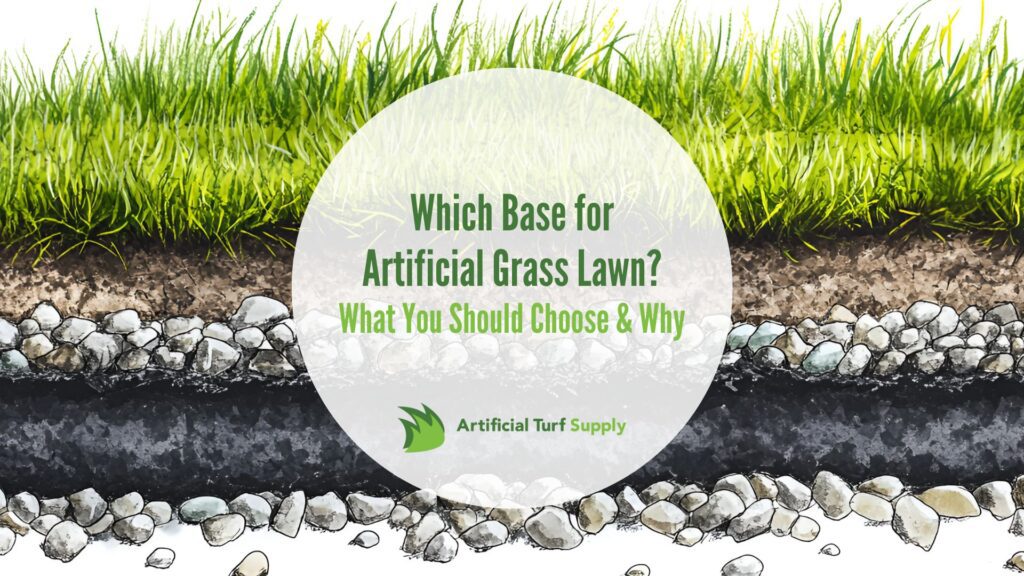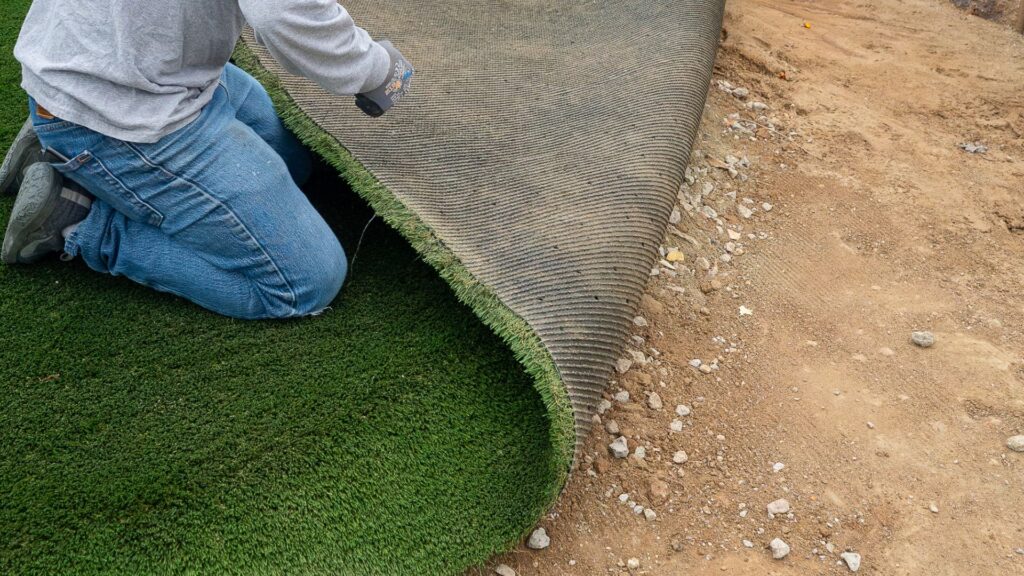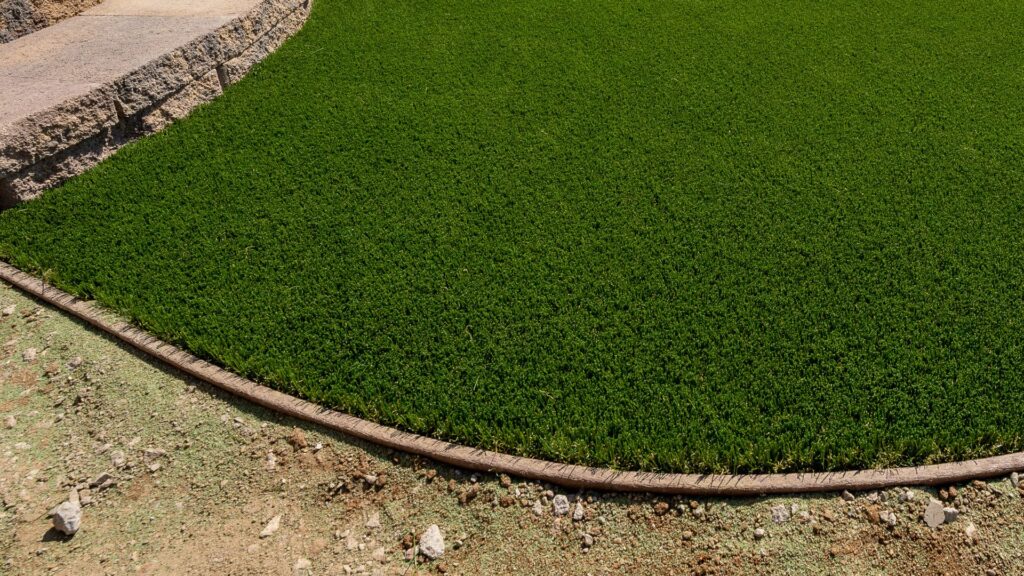So, you’re savvy homeowner who’s ready to take the synthetic turf plunge. Maybe you’ve already chosen the perfect artificial grass for your outdoor space. And now you’re asking yourself: “For my new lawn, what is the best base for artificial grass?” Road base, decomposed granite, pea gravel … you have a few options. Each has their pros and cons. And whichever you choose will ultimately affect your turf’s stability, drainage, and longevity … as well as your overall project budget.
So, let’s get to it then, my savvy sub-base students.
How Important is a Base for Artificial Grass?
Your artificial grass’s base (also called a sub base) is like your turf’s unsung hero. The strong, silent bestie who’s always got your lawn’s back. So, what it is? The base for artificial grass is a layer of material that installers lay in between the dirt and your turf. It goes in after your ground has been prepped, and it becomes your artificial grass’s foundation.
So, why is a good foundation important to your new lawn? Well, rolling out artificial grass without a solid foundation usually ends up with a lawn that looks like a lumpy, wrinkly mess. Trust me on this: that’s not a good lawn look. A well-installed base has a few crucial functions.
-
- Stability: A well-compacted base keeps your artificial grass from shifting, sinking, or developing bumps and dips over time. Uneven turf looks bad, but also feels bad to walk on.
- Drainage: The right base material lets water drain efficiently, and this prevents water from pooling on your lawn. Again, standing water on your lawn is definitely no bueno. It attracts pests, it can lead to stains, mold, or worse. You just really want good drainage.
- Longevity: And a solid foundation helps your artificial grass withstand heavy foot traffic, as well as general wear-and-tear over time. So that Superman subbase protects your lawn investment.
And that’s exactly how you should be considering this whole artificial grass project: an investment. For a long-lasting, quality turf experience, you’ll need to get quality products and a professional-grade installation up-front.
It doesn’t matter if you’re planning to DIY your synthetic turf or have professionals do the whole process. Your first step should be getting the advice, insights, and recommendations you can only get from professionals with decades of experience. The Artificial Turf Supply team would love to talk you through it all: 866) 677-9405
Common Base Materials for Artificial Grass Lawns
Choosing the best base for artificial grass simply comes down to knowing your options. What are they? What are the strengths of each? And why should you choose any given one? Here’s the important facts you need to know to make that very decision.
1. Crushed Miscellaneous Base (CMB)
-
- Budget-friendly (always a great perk)
- Excellent stability (no more wobbly turf)
- Good drainage (say goodbye to puddles)
This is kind of a crowd favorite, folks. If there’s a Swiss Army knife of base materials, it’s CMB. It’s versatile. It’s reliable. It’s not overly expensive. And it gets the job done. So, what is it? It’s basically a mix of recycled concrete and asphalt, with particles no larger than 3/4 inch. (That last part is important for your lawn’s stability.)
Pro tip: Look for a product that maintains a 70:30 ratio of solid mass to fine-grain materials. Trust me, your turf will love you for it.
2. Decomposed Granite (DG)
-
- Super smooth finish (perfect for putting greens)
- Excellent drainage (water flows through it like a sieve)
- Aesthetically pleasing
Now, if CMB is the reliable family sedan, decomposed granite is the sporty convertible. It’s a bit pricier, but it’s got some serious perks. So if you’re looking to create that silky-smooth putting green feel, you should check out DG. Just make sure your installer has worked with it before.
Decomposed Granite Warning: this stuff can settle over time, especially in the first year. Ask your installer about this before you pull the trigger on DG. And don’t be surprised if you need to do some touch-ups.
3. Pea Gravel
Ah, pea gravel. It’s like that friend who seems great at first but turns out to be a bit flaky. Sure, it looks nice and feels good underfoot, but:
-
- It’s too round and slippery (your turf might start doing the cha-cha)
- It doesn’t compact well (hello, bumpy lawn!)
My advice? Save the pea gravel for your garden paths.
4. Class II Road Base
-
- Highly stable (it’s used for roads, after all)
- Excellent for drainage (no more swamp lawn)
- Long-lasting (it’s in for the long haul)
Now we get to the good stuff. The premium. The deluxo! Class II road base is the stuff often used for, you guessed it, actual roads. (Shocker!) It’s made of this perfect crushed-rock cocktail, ranging from itty-bitty particles to chunks about 3/4 inch in size. This is where Class II gets its superpower – incredible compaction.
When you lay this bad boy down and give it a good tamping, it locks together tighter than a jigsaw puzzle. Plus, it’s nice and permeable! Water can flow through it faster than my dog runs through my sprinklers on a hot day.
The downside of Class II road base? It’s pricier than CMB. But hey, quality comes at a cost. And sometimes Class II is overkill for smaller or less-used outdoor spaces. I mean, it’s made to stand up to 2-ton trucks. It can definitely handle your pooch or a backyard BBQ, but you might not need it for less-used lawns.
Installing Your Base for Artificial Grass
The next obvious step (at least for those of you hoping to do most of the work for yourselves) is understanding how to install that base like a pro. If you have artificial grass installation experience, great! This should just be a refresher for you.
If you’ve never installed synthetic turf, though, please hear me on this. Talk to some professionals. Artificial grass steps can be tricky. They are work-intensive. And they need to be done right the first time or your whole artificial turf investment could be ruined. Our friendly Artificial Turf Supply team would love to chat with you: 866) 677-9405
Installation Tips
-
- Remove existing grass and soil (about 3-4 inches deep)
- Grade the area for proper drainage (water should flow away from your house)
- Lay down your chosen base material (about 3-4 inches thick)
- Compact, compact, compact! (Rent a plate compactor – your back will thank you)
- Add a layer of weed barrier fabric (optional, but recommended)
A good base is like a good foundation for a house. Get it right, and everything else will that much more stable and enduring. Get it wrong, though, and … well, let’s just plan to get it right.
The SubBase Takeaway
So for your lawn, what’s the best base for artificial grass? Unfortunately, there’s no single right answer because no two lawnscaping projects are the same. Class II road base is often a fantastic option. It’s stable, drains well, and lasts a long time. But it can also be overkill for smaller or less-used lawns. And if you’re on a budget, CMB is a solid choice.
But whatever you do, please, please, PLEASE don’t skimp on the base! Your long-lasting, beautiful artificial lawn needs a firm foundation. And future-you really doesn’t want to have to do this whole project again.
Go enjoy some lawn-time, everyone!
Contact our team to quote your project today!





